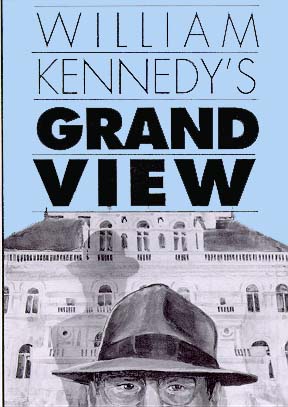
Through six novels of his "Albany Cycle," two books of nonfiction prose and a powerful play, William Kennedy has become something more than a community fixture of the Capital Region, he has become its spirit guide. In two new works about to emerge, the novel, The Flaming Corsage, to be released at the end of April from Kennedy's publisher, Viking, and the play Grand View, given its premiere by the Capital Repertory Company in May (1996), Kennedy only adds to the legend which has grown around him.
When, as rarely happens, a writer and a place merge, mesh, and acquire synergy, making something in the combination that hasn't been seen before, both readers and critics take note. When that blend becomes so dynamic that both literature and the space of people's lives are affected, something wonderful begins to happen: people, as one writer put it, "recognize a sense of community and of common destinies on a deeper level than that of practical affairs."
At its best, that's what American literature is about: in stories and novels from Hawthorne and Melville to Hemingway and William Faulkner, and in drama from Eugene O'Neill to Lillian Hellman to August Wilson, the greatest American writers write of what they know, their home spaces, and in so doing make them real, pungent, palpable, and accessible on the stage of life.
William Kennedy, a steadfast member of the community of Albany and the Capital District, not to mention a shaper of its self-understanding, has become both an actor and a voice on the ground it offers. Dead soil to most, or at least rocky and infertile. But what Kennedy has done has brought this landscape into blossom, flower and fruit. The literary map is incomplete without Albany wedged in among James Fenimore Cooper's upstate frontiers, Robert Frost's Vermont, and Herman Melville's, Henry James's, and Edith Wharton's Berkshires.
Both The Flaming Corsage and Grand View enhance that connection. The Flaming Corsage, which along with Quinn's Book and Very Old Bones, completes the second trilogy in the Albany Cycle (the first is comprised of Legs, Billy Phelan's Greatest Game, and the Pulitzer Prize-winning Ironweed), offers us a turn-of-the-century playwright, Edward Daugherty, whose ambition comes to naught.
"Wounded by history, branded by ancestry" as one reviewer aptly put it, Edward gamely attempts to make art out of life.
Along with Edward are his wife, Katrina, worn to melancholy by an unhappy life; the talented, self-destructive Thomas Maginn, a journalist who becomes at once Edward's alter ego and nemesis; and Melissa Spencer, "a gifted conscienceless actress who becomes Daughery's lover and sets in motion a murder/suicide that comes close to destroying Daughtery." Another writer, for Kirkus Reviews, neatly summarized the rather complex issues of The Flaming Corsage. As the reviewer put it, "The long struggle of Albany's Irish population to seize power from the governing elite is never far from the action: Daugherty, given a start in life by a wealthy benefactor, uses his plays to celebrate the resiliency of the Irish and lampoon the Dutch and English who rule the town." But it is the combined struggle of Edward and Katrina that drives the plot, through deaths, betrayals, and deceits.
There are some fascinating self-contained set pieces in the novel, notably the youthful Edward's musing on the suppression of the Irish, a new years hotel conflagration, and Katrina's comical effort to get materials assembled for administering last rites. This last segment alone is worthy of Joyce's Dubliners, or the "Spotted Horses" section of William Faulkner's The Hamlet. But what's most compelling about Kennedy's effort is his ability to present a huge novel, which covers decades and generations, in barely over two hundred pages. He does this by telling the story in non-linear fashion. The reader fills in the gaps of time following Kennedy's strategic foreshadowing and hindsight. The result is a system of revelation that is hallmark Kennedy. The last quarter of the book moves rapidly across time with a darkness and regret reminiscent of Ironweed's best. The book is an exhilarating, masterful achievement, whose last line, "there would always be bacon," pierces the heart much as that flaming sliver of wood earlier pierces the corsage on Katrina's breast.
There's a score to be settled. Corbett Atterby, his wife, Mabel, and his daughter Faye, come to pull the plug on Patsy's local machine at the behest of the Governor. But Patsy and Corbett have some older scores to settle. Patsy, surrounded by martinets who do his bidding, thinks of himself as the Civil War general, Grant, at Vicksburg, managing a siege. Corbett has the goods on the machine, but Patsy's comeuppance is one-upped by a dark history that lies with Mabel and her daughter. A strange dance of one-upmanship ensues, the likes of which are reminiscent of Hellman's "The Little Foxes," and Warren's "All The King's Men" with touches of classic films like "Key Largo," "Casablanca," and "The Maltese Falcon" thrown in.
The characters are sharply drawn, and the locale and setting give the play a film noire quality reminiscent of the best of Bogart. The action comes fast and the repartee among the characters is swift and witty. Who finally wins in this clash of titanic forces? Strangely, and productively, it is Albany, the richness of its history, and the sharpness of its characters. To say more than that William Kennedy has yet again delivered on his talented promise would be to say too much. Come and see.
Grand View premiered at Capital Repertory Theater in Albany from May 8-June 2, 1996.
Donald Faulkner is Associate Director of the New York State Writers Institute.